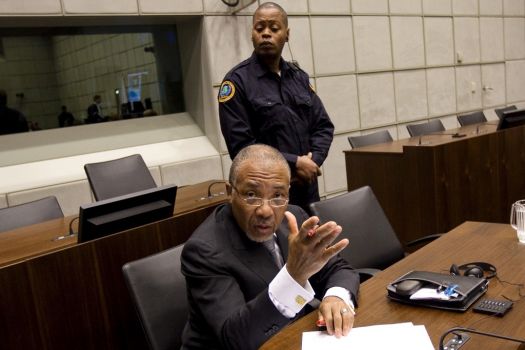
Charles Taylor, the former Liberian president, has accused the prosecution of paying witnesses to testify against him in his war crimes trial.
Charles Taylor, 64, who was found guilty of aiding and abetting war crimes last month, is addressing judges at The Hague.
It is Charles Taylor’s last chance to speak at the international court before he is sentenced later this month.
He was convicted of arming rebels in Sierra Leone during its civil war and helping them plan atrocities.
In its landmark ruling last month, the Special Court for Sierra Leone found Charles Taylor guilty on 11 counts, relating to atrocities that included rape and murder.

Delivering his statement from a witness box on Wednesday, Charles Taylor said money had played a “corrupting” role in his trial.
“Witnesses were paid, coerced and in many cases threatened with prosecution” if they did not testify against him, Charles Taylor said.
He also said judges were handicapped by not having the “full contextual picture” of events at the time.
Charles Taylor said he condemned atrocities across the world, and had the “deepest sympathy” for victims in Sierra Leone.
From the outset of the trial, Charles Taylor has insisted he is innocent of all charges.
The prosecution wants an 80-year prison term, which the defense says is excessive.
Prosecutors have said that Charles Taylor’s ill health and age, or the fact that he has a family, should have no impact on the sentence.
In written filings, prosecutors said a sentence of 80 years would reflect the severity of the crimes and the central role that Charles Taylor had in facilitating them.
“The purposely cruel and savage crimes committed included public executions and amputations of civilians, the display of decapitated heads at checkpoints… public rapes of women and girls, and people burned alive in their homes,” wrote prosecutor Brenda Hollis.
But defense lawyers said the recommended sentence was “manifestly disproportionate and excessive”, and that Charles Taylor had only been found guilty of an indirect role – aiding the rebels, rather than leading them.
They said their client should not be made to shoulder the blame alone for what happened in Sierra Leone’s war.
The court should not support “attempts by the prosecution to provide the Sierra Leoneans with this external bogey man upon whom can be heaped the collective guilt of a nation for its predominantly self-inflicted wounds”, his lawyers wrote.
During the 1991-2002 Sierra Leone civil war, Charles Taylor supported Revolutionary United Front rebels who killed tens of thousands of people.
The war crimes included murder, rape, the use of child soldiers and the amputation of limbs. In return, Charles Taylor received “blood diamonds”.
The sentence is due to be handed down on 30 May.
Charles Taylor is widely expected to appeal against any prison sentence and the hearing could continue for several more months.
Under a special arrangement with the international court, any prison term Charles Taylor does receive will be served in Britain.